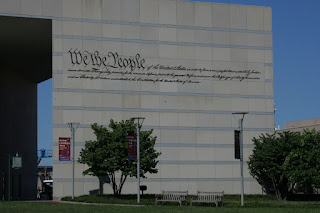
In a rare weeknight out, I attended a reception and panel discussion at the National Constitution Center earlier this week hosted by my alma mater, the Fels Institute of Government. The content was presented in a very Felsian manner, as befits a topic like transportation, with experts opining on the role of the federal government in dictating state and local policy goals, the process by which funding allocations should be determined, and the possible ways forward to break through Washington gridlock.
It occurred to me as I was sitting in the audience that I was burning precious capital with my wife, who would have to do school pick-ups, dinner, and bedtime solo, for the privilege of sitting through a wonky back-and-forth on transportation policy, and that that surely indicated that I was all sorts of nerdy. And yet this sort of stuff genuinely interests me.
I have written often in this space, in hallowed and hushed tones, of my affection for the American political process, a never-ending dialogue about the ways in which free people make decisions to allocate resources and advance the greater good in a world of scarce resources, partisan allegiances, and naked self-interest. As much mythology as has been built up over America's rugged individualism - from our frontier days to our modern free-wheeling capitalists - at the core of our American narrative is this notion that there really is such a thing as "we the people," and that there is a place, even as we go about seeking our personal gain, for figuring out how to organize around issues and choices that affect us collectively. (It won't surprise you that what I appreciated the most about President Obama's recent State of the Union address were his repeated reminders that America is strongest when America is working together.)
The cynics among us will say that there is little of this actually going on in Washington (or Harrisburg or City Hall). And that is probably true. But it doesn't mean that the ideal isn't worth cherishing, pursuing, and pushing towards.
If there is any place that could and should set the pace in this way, it would be the church. Here is an institution whose founding documents speak of "there is no Jew or Gentile," of "the priesthood of believers," and of "so that the body of Christ may be built up." If any place has a reason and an ability to subsume personal gain for greater good, it should be the Church with a capital C. Alas, here there is probably just as much if not more cynicism. But, again, it does not negate that that is where we should be, where we should aspire, and where we should move towards.
Neither church nor state need intrude on every aspect of my life. But, as a single component of both groups, I acknowledge that there are things that are worth taking up at a higher and more collective level. Those things are often the really important things, and because of their significance and the difficulty of working together, those things are often the harder things to pull off. We may never get it just right, but let us not lose heart and stop trying.


No comments:
Post a Comment